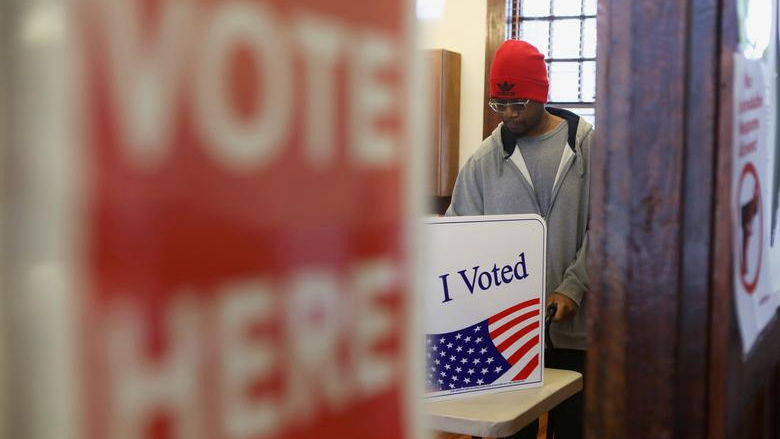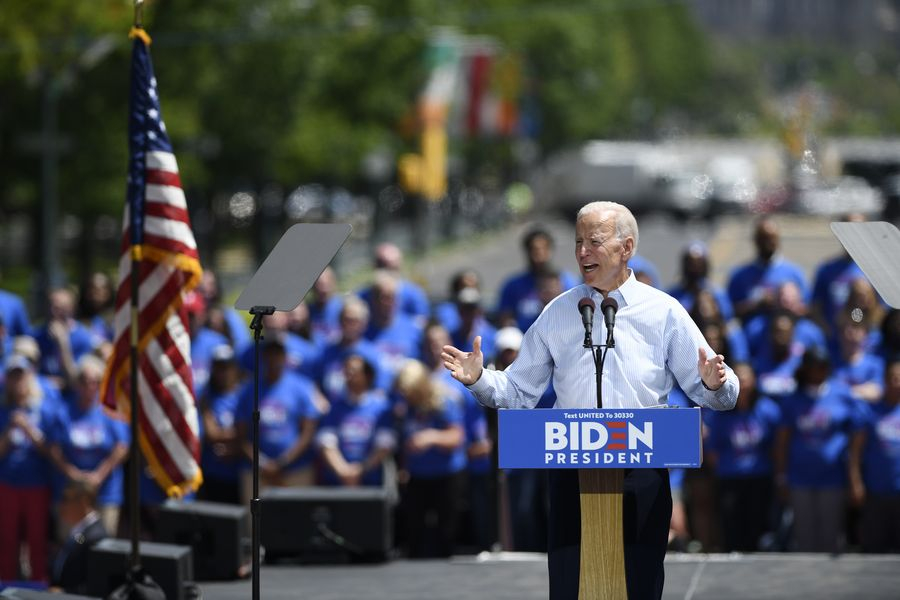
People vote at a train station used as a polling station for the South Carolina primary in Denmark, South Carolina, February 29, 2020. /Reuters
People vote at a train station used as a polling station for the South Carolina primary in Denmark, South Carolina, February 29, 2020. /Reuters
Editor's note: Hannan Hussain is a security analyst at the South Asia Center, London School of Economics, and an author. The article reflects the author's opinions, not necessarily the views of CGTN.
On February 29, Bernie Sanders and Joe Biden went head to head in the South Carolina Democratic primary. The state is known for its sizable African-American representation, with some 60 percent of Democratic support concentrated among black voters.
In nearly six decades, never has a Democrat succeeded to the realms of power without having African-American interests on board. How difficult is it to shoot up the charts in a big, mega-diverse Southern state? Biden gave Sanders a definitive answer.
The former vice president emerged with a thumping win, leveraging a lion's share of African-American voters to secure a much-needed revival. Exit polls underlined some 55 percent of African-American representation among voters, most of who chose Biden. Meanwhile, Sanders capped the 29 or younger bracket for a distant second place.
Biden's win proved both comprehensive and timely.
A crucial advantage for the former vice president's win was his historic appeal, which gained new impetus this week: a crucial Monmouth University poll found Biden leading with 36 percent state-wide support, more than twice the numbers favoring Sanders. Other polls saw Biden leading by single digits prior to voting. Today, this is exactly what happened: heavy margins put excessive mileage between Biden and his counterparts.
For Sanders, today's loss is far from a bad moment. First, his campaign made a dedicated effort in terms of time, activism, outreach, resources, and media support to make a better case for black voters than in 2016.
It shows in his superior finishes over the likes of Warren, Klobuchar, Buttigieg and Steyer, and the fact that he continues to break ground after some 28 percent in black voters drove him to triumph in the Silver State.
Second, this is Sanders' first Democratic primary loss so far, but Biden's first-ever in a three-time presidential run. Heading into Super Tuesday may require more of Bernie's consistency, and less of Biden's newfound fervor.

U.S. Senator Bernie Sanders speaks during his first presidential campaign rally in Brooklyn College, New York, the United States, March 2, 2019. /Xinhua
U.S. Senator Bernie Sanders speaks during his first presidential campaign rally in Brooklyn College, New York, the United States, March 2, 2019. /Xinhua
Third, Sanders didn't let Biden get away without pressure. "You can see a very concerted effort from Sanders, and I think that its one of the reasons he has been able to put pressure on former Vice President Joe Biden in South Carolina,"noted South Carolina Democratic Party Chair Trav Robertson. "It appears the Sanders campaign has had the ability to not only learn from 2016, but has adapted, and they've implemented those changes."
All of this attests to Sanders' democratic socialist appeal, which throughout his presidential campaign has cut across Latino and Black segments, with relative gains in Biden's own stronghold.
Looking towards Super Tuesday, it is the Vermont Senator's ability to target multiple segments, retain working-class support within power circles, and turn the tide on his 2016 campaign shortcomings that will make him a force to reckon with. His peers don't come close.
Interestingly, Biden triumphed on February 29 by centering the voter field around his heydays, which includes ties with President Obama. Unlike Biden, Obama never referenced a former candidate's reputation to reinforce his own standing among African-Americans.
Even when Mr. Obama routed former Secretary of State Hilary Clinton in the 2008 primaries, it was his coalition of black and white voters that paved the way for a commanding victory. Clinton was clever enough to follow Obama, and rout Sanders using the same sample.
But Biden's victory today took a contrarian route: one where three straight losses and added concern from his chief endorsement didn't stop the Southern surge.
Generational and ideological considerations notwithstanding, South Carolina's electorate is still not a litmus test for democrats' national electability. It offers the first glimpse into the motivations and persuasions of a majority-black voter base, testing candidates' abilities to diversify their campaign positions beyond white-majority audiences. Biden has all that covered.
But the real test for national electability arrives on Super Tuesday, when the greatest number of U.S. states will award one-third of the total delegates, featuring some very strong African-American electorates.

Former U.S. Vice President Joe Biden speaks during a rally in Philadelphia May 18, 2019. /Xinhua
Former U.S. Vice President Joe Biden speaks during a rally in Philadelphia May 18, 2019. /Xinhua
Tuesday's exercise will also test a resurgent Biden and resolute Sanders on majoritarian appeal, while revealing key insights on which voting patterns African Americans – constituting 25 percent of the national Democratic electorate – are likely to follow.
In terms of majoritarian appeal, Sanders is already polling strongly in two of the 14 largest states, according to data published by CNN and SRSS this week. An improved growth among younger black voters in South Carolina is a sustained plus to Sanders' forthcoming penetrations.
For Biden, the South Carolina results offer an excellent lifeline, but no decisive advantage for Super Tuesday. The former Vice President's 14-state campaign is already lagging in terms of the level of fundraising activity needed to mobilize big-state support, or resources needed to ignite media coverage and local outreach.
His promise as a candidate that could win and hold diverse voter bases is already dwarfed by shambolic losses in Iowa and New Hampshire – where even underperforming democrats broke ground with voters. Consolidating Super Tuesday will be no loyalty game.
Ultimately, Bernie's relative success with multi-segment targeting now enjoys some merits of improved traction among African Americans. But Biden's thumping South Carolina victory comes with hopes of a "change in fortunes" for Tuesday. Contemplating this possibility well in advance, could prove counterproductive.
(If you want to contribute and have specific expertise, please contact us at opinions@cgtn.com.)